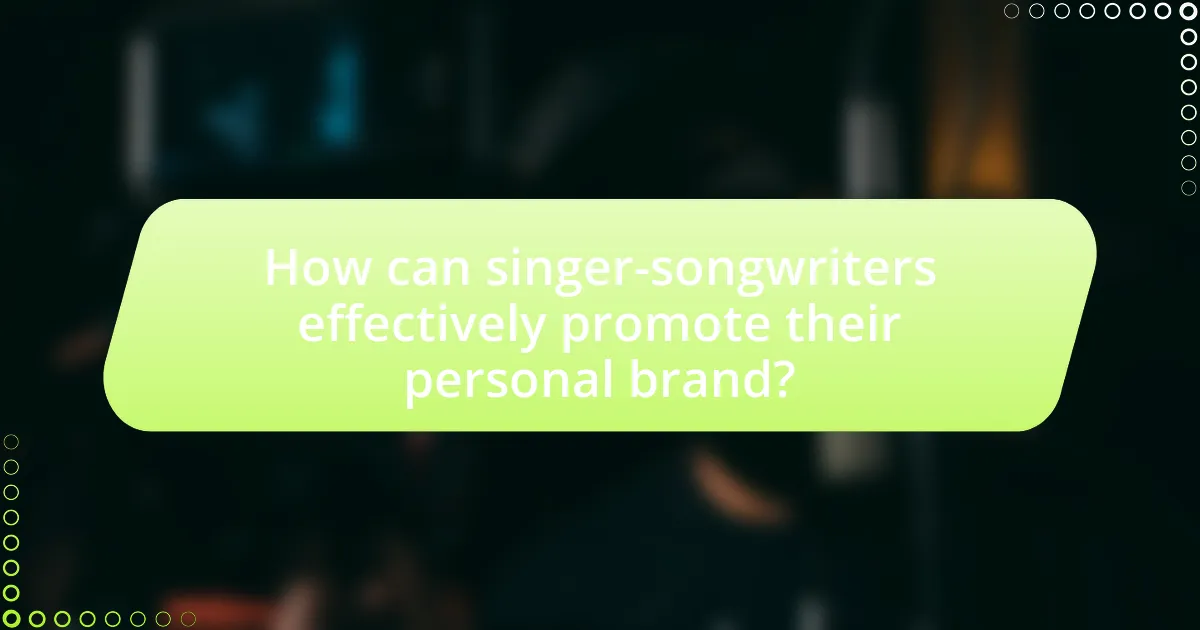Building a personal brand as a singer-songwriter involves creating a distinct identity that resonates with audiences and sets the artist apart in the competitive music industry. Key elements include defining musical style, visual identity, and consistent messaging across platforms. The article explores the importance of personal branding, its impact on career success, and strategies for establishing and maintaining a brand, such as audience engagement, storytelling, and collaborations. Additionally, it highlights the significance of social media in promoting a personal brand and offers practical tips for singer-songwriters to effectively connect with their audience and enhance their visibility.

What does it mean to build a personal brand as a singer-songwriter?
Building a personal brand as a singer-songwriter means creating a unique identity that resonates with audiences and distinguishes the artist in a competitive music industry. This involves defining one’s musical style, visual aesthetics, and messaging to establish a cohesive presence across various platforms, such as social media, music streaming services, and live performances.
For instance, successful singer-songwriters like Taylor Swift and Ed Sheeran have effectively built their brands by consistently aligning their music, public persona, and engagement strategies, which has led to significant fan loyalty and commercial success. According to a 2021 report by the International Federation of the Phonographic Industry, artists with strong personal brands are more likely to achieve higher streaming numbers and ticket sales, underscoring the importance of brand building in the music industry.
Why is personal branding important for singer-songwriters?
Personal branding is crucial for singer-songwriters because it helps them establish a unique identity that resonates with their audience. A strong personal brand differentiates them in a competitive music industry, allowing them to connect emotionally with fans and build a loyal following. According to a study by the Berklee College of Music, artists with a well-defined personal brand are more likely to attract opportunities for collaborations, performances, and sponsorships, ultimately leading to greater career success.
How does a strong personal brand impact a singer-songwriter’s career?
A strong personal brand significantly enhances a singer-songwriter’s career by increasing visibility and attracting a dedicated fan base. This visibility leads to more opportunities for performances, collaborations, and media exposure, which are crucial for career growth. For instance, artists like Taylor Swift and Ed Sheeran have cultivated distinct personal brands that resonate with their audiences, resulting in millions of album sales and sold-out tours. Research indicates that 70% of consumers are more likely to support brands they feel a personal connection with, underscoring the importance of a relatable and authentic personal brand in the music industry.
What are the key elements of a personal brand for a singer-songwriter?
The key elements of a personal brand for a singer-songwriter include a unique musical style, a compelling narrative, visual identity, audience engagement, and consistent messaging. A unique musical style differentiates the artist in a crowded market, while a compelling narrative connects emotionally with listeners, often reflecting personal experiences or values. Visual identity, including logos and promotional materials, enhances recognition and appeal. Audience engagement through social media and live performances fosters a loyal fan base. Consistent messaging across platforms ensures that the artist’s brand remains coherent and recognizable, reinforcing their identity in the music industry.
What are the first steps in building a personal brand as a singer-songwriter?
The first steps in building a personal brand as a singer-songwriter include defining your unique musical identity and creating a consistent online presence. Defining your musical identity involves identifying your genre, style, and the themes that resonate with your music, which helps differentiate you from other artists. Creating a consistent online presence requires establishing profiles on social media platforms and music streaming services, where you can share your music, engage with fans, and showcase your personality. According to a survey by the Music Industry Research Association, 70% of music consumers discover new artists through social media, highlighting the importance of an effective online strategy.
How can singer-songwriters identify their unique style and voice?
Singer-songwriters can identify their unique style and voice by experimenting with various musical genres, lyrical themes, and personal experiences. This process involves actively exploring different sounds, instruments, and songwriting techniques to discover what resonates most authentically with them. For instance, analyzing the works of influential artists can provide insights into diverse styles, while self-reflection on personal stories and emotions can help in crafting distinctive lyrics. Research indicates that artists who engage in consistent practice and seek feedback from peers are more likely to refine their unique sound, as evidenced by studies showing that iterative creative processes lead to greater artistic development.
What role does storytelling play in a singer-songwriter’s personal brand?
Storytelling is essential in a singer-songwriter’s personal brand as it creates emotional connections with the audience. By sharing personal experiences and narratives through their music, singer-songwriters can differentiate themselves in a crowded market, fostering authenticity and relatability. Research indicates that storytelling enhances listener engagement, as studies show that narratives can increase memory retention by up to 65%. This emotional resonance not only attracts fans but also encourages loyalty, as audiences feel a deeper bond with the artist’s journey and message.

How can singer-songwriters effectively promote their personal brand?
Singer-songwriters can effectively promote their personal brand by leveraging social media platforms to engage with their audience and showcase their music. Utilizing platforms like Instagram, TikTok, and YouTube allows them to share behind-the-scenes content, live performances, and personal stories, which fosters a deeper connection with fans. According to a 2021 report by the International Federation of the Phonographic Industry, 70% of music consumers discover new artists through social media, highlighting its importance in brand promotion. Additionally, collaborating with other artists and influencers can expand their reach and introduce their music to new audiences, further solidifying their brand identity.
What platforms should singer-songwriters use for brand promotion?
Singer-songwriters should use social media platforms like Instagram, Facebook, and TikTok for brand promotion. These platforms allow artists to engage directly with their audience, share content, and showcase their music. For instance, Instagram’s visual nature is ideal for sharing behind-the-scenes content and music videos, while TikTok’s short-form video format has been instrumental in launching viral music trends. According to a 2021 report by the International Federation of the Phonographic Industry, 70% of music consumers discover new music through social media, highlighting the effectiveness of these platforms for brand promotion.
How can social media enhance a singer-songwriter’s personal brand?
Social media can enhance a singer-songwriter’s personal brand by providing a platform for direct engagement with fans and showcasing their music and personality. Through regular posts, live performances, and interactive content, singer-songwriters can build a loyal following and create a unique identity that resonates with their audience. For instance, a study by the Pew Research Center found that 72% of adults use social media, making it an essential tool for reaching a broad audience. Additionally, platforms like Instagram and TikTok allow artists to share snippets of their creative process, fostering a deeper connection with fans and increasing visibility in a competitive industry.
What are the best practices for engaging with fans online?
The best practices for engaging with fans online include consistent interaction, authentic communication, and providing valuable content. Consistent interaction fosters a sense of community, as regular updates and responses to comments keep fans engaged and informed. Authentic communication builds trust; sharing personal stories and behind-the-scenes content allows fans to connect on a deeper level. Providing valuable content, such as exclusive music previews or insights into the creative process, enhances fan loyalty and encourages sharing. According to a study by the Pew Research Center, 69% of adults in the U.S. use social media, highlighting the importance of these platforms for maintaining fan relationships.
How can collaborations influence a singer-songwriter’s brand?
Collaborations can significantly enhance a singer-songwriter’s brand by expanding their audience reach and diversifying their musical style. When a singer-songwriter partners with other artists, they tap into each other’s fan bases, which can lead to increased visibility and new followers. For instance, collaborations often result in cross-promotion on social media platforms, where both artists share the work, thereby amplifying their collective exposure. Additionally, working with different musicians can introduce unique sounds and influences, allowing the singer-songwriter to evolve their artistic identity and appeal to a broader demographic. This strategic alignment can also enhance credibility, as associations with established artists can elevate a singer-songwriter’s reputation in the industry.
What types of collaborations are most beneficial for singer-songwriters?
Collaborations that are most beneficial for singer-songwriters include co-writing with other songwriters, partnering with producers, and engaging in cross-genre collaborations. Co-writing allows singer-songwriters to blend different styles and perspectives, enhancing creativity and expanding their musical repertoire. Working with producers can elevate the production quality of their music, as producers often bring technical expertise and industry connections. Cross-genre collaborations can introduce singer-songwriters to new audiences and diversify their sound, which is crucial for building a personal brand in a competitive market. These types of collaborations have been shown to increase exposure and opportunities within the music industry, as evidenced by successful artists who have leveraged such partnerships to enhance their careers.
How can partnerships with other artists enhance brand visibility?
Partnerships with other artists can significantly enhance brand visibility by leveraging each other’s audiences and networks. When artists collaborate, they create opportunities for cross-promotion, allowing them to reach new fans who may not have been previously aware of their work. For instance, a study by Nielsen Music found that collaborations can increase streaming numbers by up to 50%, demonstrating the tangible impact of shared exposure. Additionally, partnerships often result in joint marketing efforts, such as co-hosted events or social media campaigns, which further amplify visibility and engagement.

What strategies can singer-songwriters use to maintain their personal brand?
Singer-songwriters can maintain their personal brand by consistently engaging with their audience through social media, producing high-quality content, and staying authentic to their musical identity. Regular interaction on platforms like Instagram and Twitter helps build a loyal fan base, as evidenced by studies showing that artists who actively communicate with fans see increased engagement and support. Additionally, releasing music that reflects their unique style and personal experiences reinforces their brand identity, as seen in the success of artists like Taylor Swift, who has built her brand around storytelling and authenticity. By combining these strategies, singer-songwriters can effectively sustain and grow their personal brand in a competitive industry.
How can consistency in branding affect a singer-songwriter’s image?
Consistency in branding significantly enhances a singer-songwriter’s image by establishing a recognizable identity that resonates with audiences. When a singer-songwriter maintains uniformity in visual elements, messaging, and musical style, it fosters trust and loyalty among fans. For instance, artists like Taylor Swift and Ed Sheeran have successfully utilized consistent branding across their album covers, social media presence, and public appearances, which has contributed to their strong personal brands and widespread recognition. This cohesive approach not only differentiates them in a crowded market but also reinforces their artistic narrative, making it easier for fans to connect emotionally with their music.
What are the risks of brand inconsistency for singer-songwriters?
Brand inconsistency for singer-songwriters can lead to a loss of audience trust and diminished marketability. When a singer-songwriter presents conflicting messages or styles, it confuses fans and dilutes their identity, making it difficult for listeners to connect emotionally. Research indicates that 64% of consumers cite shared values as the primary reason for their loyalty to a brand, highlighting the importance of a cohesive image. Additionally, inconsistent branding can result in missed opportunities for collaborations and partnerships, as industry professionals often seek artists with a clear and recognizable brand.
How can singer-songwriters adapt their brand over time?
Singer-songwriters can adapt their brand over time by evolving their musical style, engaging with their audience through social media, and collaborating with other artists. Evolving musical style allows them to stay relevant and attract new listeners, as seen with artists like Taylor Swift, who transitioned from country to pop, broadening her fan base. Engaging with audiences on platforms like Instagram and TikTok fosters a personal connection, which is crucial for brand loyalty. Collaborations with diverse artists can introduce singer-songwriters to different genres and fan bases, enhancing their visibility and appeal. These strategies demonstrate how adaptability in branding can lead to sustained success in the music industry.
What role does audience feedback play in shaping a singer-songwriter’s brand?
Audience feedback plays a crucial role in shaping a singer-songwriter’s brand by providing insights into listener preferences and emotional connections. This feedback allows artists to tailor their music, image, and marketing strategies to better resonate with their audience. For instance, data from platforms like Spotify and social media analytics can reveal which songs are most popular, guiding the artist in future songwriting and performance choices. Additionally, direct interactions, such as comments and reviews, help singer-songwriters understand their audience’s values and expectations, enabling them to build a more authentic and relatable brand.
How can singer-songwriters effectively gather and utilize audience feedback?
Singer-songwriters can effectively gather and utilize audience feedback by employing direct engagement strategies such as social media polls, live Q&A sessions, and post-performance surveys. These methods allow artists to collect specific insights about their music and performances directly from their audience. For instance, a study by the Berklee College of Music found that 70% of musicians who actively engage with their audience on social media report improved fan loyalty and better understanding of their audience’s preferences. By analyzing this feedback, singer-songwriters can make informed decisions about their music style, setlists, and marketing strategies, ultimately enhancing their personal brand and connection with fans.
What are the best ways to respond to audience feedback while maintaining brand integrity?
The best ways to respond to audience feedback while maintaining brand integrity include actively listening to feedback, addressing concerns transparently, and aligning responses with brand values. Actively listening demonstrates respect for the audience’s opinions, which fosters trust. Addressing concerns transparently allows for open communication, reinforcing authenticity. Aligning responses with brand values ensures that the brand’s identity remains consistent, as seen in successful artists like Taylor Swift, who often engages with her fans while staying true to her artistic vision. This approach not only enhances audience loyalty but also strengthens the overall brand image.
What are some practical tips for building a personal brand as a singer-songwriter?
To build a personal brand as a singer-songwriter, focus on creating a unique musical identity and engaging with your audience consistently. Establish a distinct sound and visual style that reflects your personality, as this helps differentiate you in a competitive market. Utilize social media platforms like Instagram, TikTok, and YouTube to share your music, behind-the-scenes content, and personal stories, fostering a connection with fans. Collaborate with other artists and influencers to expand your reach and credibility. Regularly perform live, whether in-person or virtually, to showcase your talent and build a loyal following. According to a study by the Berklee College of Music, artists who actively engage with their audience online see a 30% increase in fan loyalty and support.
How can singer-songwriters leverage their unique stories in branding?
Singer-songwriters can leverage their unique stories in branding by authentically sharing personal experiences that resonate with their audience. This connection fosters emotional engagement, making their music more relatable and memorable. For instance, artists like Taylor Swift have effectively used their life events, such as relationships and personal struggles, to create a narrative that enhances their brand identity. Research indicates that storytelling in branding can increase audience loyalty by up to 55%, demonstrating the power of personal narratives in establishing a strong brand presence.
What common mistakes should singer-songwriters avoid when building their brand?
Singer-songwriters should avoid inconsistency in their branding, as it can confuse their audience and dilute their identity. Maintaining a cohesive image across social media, music releases, and promotional materials is crucial for establishing a recognizable brand. Research indicates that brands with consistent messaging can see up to 23% more revenue, highlighting the importance of a unified approach. Additionally, neglecting audience engagement can lead to a disconnect; actively interacting with fans fosters loyalty and community. Lastly, failing to invest in professional quality for music production and visuals can undermine credibility, as listeners often associate high production values with professionalism.
